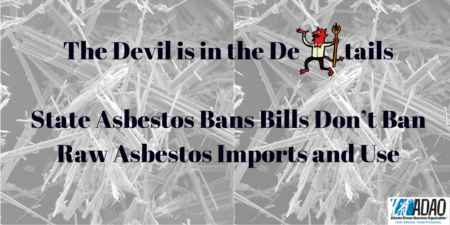Posted on June 28, 2019
 Asbestos continues to kill, and the U.S. government is sitting idly by, while its citizens are dying by the thousands.
Asbestos continues to kill, and the U.S. government is sitting idly by, while its citizens are dying by the thousands.
America needs a federal ban on imports, use, and distribution of all forms of asbestos and contaminated products. That is what the bicameral Alan Reinstein Ban Asbestos Now Act (ARBAN) of 2019 would accomplish in under a year, and why ADAO has been laser-focused on its passage.
However, in recent months a number of state-specific bans have been introduced. Organized by CureMeso/MARF, these bills claim to ban asbestos, but they do not. Their patchwork campaign approach to the asbestos problem is far short of the national solution we need.
A recently signed state law in New Jersey, as well as a bill working its way through state legislature in Connecticut, theoretically implements a ban on asbestos-containing products. While these bills may seem a victory at first blush, they fail to implement the prohibition on imports and manufacture of asbestos, which presents the clearest threat to the health of the American public. To be clear, the Connecticut state asbestos ban bill and the New Jersey ban law do not ban raw asbestos imports and use.
The risk posed by consumer goods pales in comparison to the danger created by raw asbestos being shipped into our ports, trucked through our communities, used in our factories, and disposed of in our landfills. In 2018, 750 metric tons of raw asbestos were brought into the country for use in the manufacture of chlorine. Only a complete federal ban without loopholes or exemptions can mitigate and end this known widespread risk.
Each of these bills makes admirable steps forward, but they fall short. For example, the New Jersey law prohibits the sale and distribution of asbestos-containing products in the state, and imposes a $2,500 per violation fine on those who violate the law. In Connecticut, the proposed legislation which has passed the Senate would ban building materials. Years ago, these were a huge source of asbestos exposure risk, but these days the construction industry has largely moved away from using asbestos-contaminated products because of the undue risk and availability of safer substitutes.
The state lawmakers behind these bills acknowledge that they are stepping in to do a piece of the job that federal legislators should be handling. While it’s great that these state lawmakers have taken an active interest in doing what they can to protect their citizens from asbestos, the states that financially benefit from the asbestos industry — those with ports receiving asbestos shipments and those that are home to the chlor-alkali plants that use asbestos in their manufacturing processes — will surely never follow suit.
The asbestos industry will only stop dealing in this toxic trade if federal law requires it. Until then, their profit margins will always come before public health.
A state-by-state approach lacks the enforcement mechanisms that are necessary to ensure the legislation has any true protective effect. Most importantly, a state-by-state strategy dangerously distracts from the momentum we’ve worked so long and hard to build toward a federal ban. The chlor-alkali industry has long favored an approach to ban asbestos-containing products because this strategy allows them to continue importing and using raw asbestos with no oversight or consequence.
In our 15 years of advocacy toward a federal ban, we’ve never been closer to achieving it. The U.S. House and Senate ARBAN bills have over fifty co-sponsors, including 2020 presidential candidates Cory Booker, Kirsten Gillibrand, Kamala Harris, Amy Klobuchar, and Bernie Sanders. Last month, for the first time, the U.S. House held a hearing about the need to ban asbestos. Our progress is continual, and we stand firm that there is an imminent need for a federal asbestos ban.
ADAO isn’t alone. On June 1, the Environmental Information Association (EIA) sent their letter outlining their concerns to CureMeso/MARF’s Board and they are still waiting for their response.
It’s time for all of the anti-asbestos advocates to join together in this fight and unite behind the push for a federal ban. Instead of pushing for state-by-state smokescreens, we should use our energy to encourage more lawmakers to get behind the already powerfully backed ARBAN and further increase our chances of bringing this lifesaving legislation to fruition.
Without a federal ban, asbestos remains an issue that keeps every American at risk, but it’s one we have a clear path to solving, and finally, the momentum to get it done. Let’s not obfuscate the true goal with ineffective state regulations that make us feel like we’re making more progress than we really are. We simply can’t afford to compromise when it comes to lives at risk.
In unity,
Linda Reinstein
